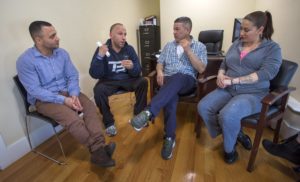
A tall, gangly man twists a cone of paper in his hands as stories from nearly 30 years of addiction pour out: the robbery that landed him in prison at 17; never getting his GED; going through the horrors of detox, maybe 40 times, including this latest, which he finished two weeks ago.
“I’m a serious addict,” says Julio Cesar Santiago, 44. “I still have dreams where I’m about to use drugs, and I have to wake up and get on my knees and pray, ‘let God take this away from me,’ because I don’t want to go back. I know that if I go back out there, I’m done.”
Santiago, who is Puerto Rican, has reason to worry. According to data produced by the Baker administration on the opioid epidemic in Massachusetts, the overdose death rate for Latinos has doubled in three years, growing at twice the rate of any other racial group.According to current and former drug users, as well as addiction treatment providers and physicians, there is a range of problems that puts Latinos at greater risk of an overdose and death. Irma Bermudez, a patient in the women’s residential unit at Casa Esparza in Boston, says the high Latino overdose death rate “has a lot to do with the language barrier”.
Bermudez says that it can be difficult for anyone who can’t read English well because websites and brochures are only in English and many times there are no translator available. While 11% of the state’s estimated opioid overdose deaths last year were Latino, Caza Esperanza has the only day and residential addiction treatment program in Boston where all the direct care staff speak Spanish.
Other reasons include poverty and the growing fear among Latinos to ask anyone perceived as “government agent” for help, especially if the person who needs the help is not an American citizen because they fear it could lead to deportation.

Recent Comments